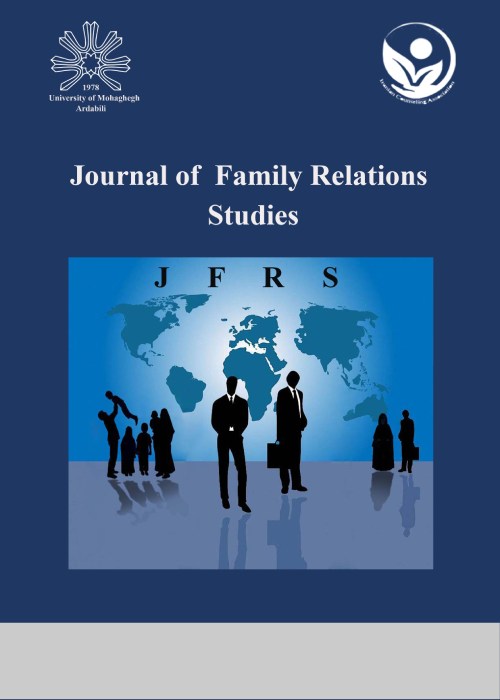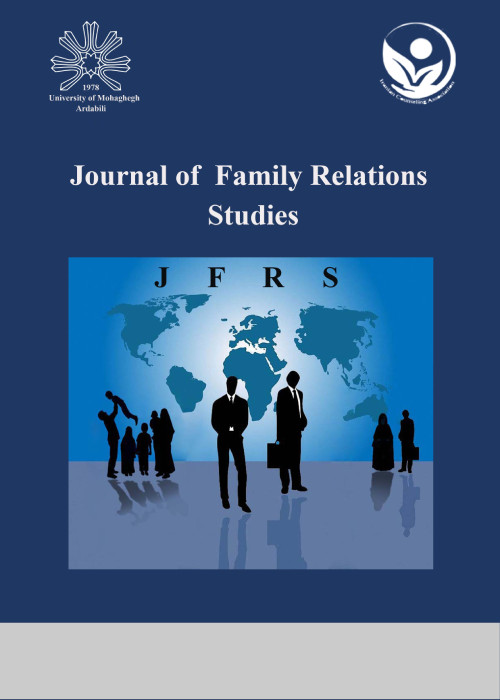فهرست مطالب

Journal of Family Relations Studies
Volume:3 Issue: 10, Jul 2023
- تاریخ انتشار: 1402/04/10
- تعداد عناوین: 6
-
-
Pages 4-16Objective
The purpose of this study was to modeling the role of organizational ethics atmospheres and work-family conflict in cyber loafing.
MethodsMethodology of the research was descriptive. The statistical population of this study included all staff of Universities affiliated with the Ministry of Science at four levels of international, national, regional and local levels of performance. The research data were collected from 430 staff members who were selected by multi-stage cluster sampling method. The sample size according to the Kregci-Morgan model and with error α = 0/05, was considered 430 persons. To collect data Cyber Loafing Questionnaire (2006), Organizational Ethical atmospheres Questionnaire (1988) and work-family Conflict Questionnaire (1985) was used. Data were analyzed by artificial neural network method.
ResultsThe results showed modeling the organizational factors affecting on cyber loafing has an input layer with seven units and a hidden layer with one unit and the artificial neural network is well able to predict the jumps and the process of cyber loafing of academic staff based on organizational factors of organizational ethics atmospheres and work-family conflict.
Conclusionsit is necessary to pay attention to these components and their effects in the organization human resource behavior and avoiding deviant behavior.
Keywords: Deviant Behavior, Cyber Loafing, Organizational Ethics atmosphere, Work-Family Conflict, Artificial Neural Network(ANN) -
Pages 17-25Objective
The increase in divorce rate has led to various studies which have tried to focus on the tendency to divorce through examining the factors affecting it and to provide preventive and therapeutic interventions. The present study was conducted with the objective of comparing the effectiveness of emotionally focused couple therapy and self-regulation couple therapy in the ego strength of couples on the verge of divorce.
MethodsThe design of this quasi-experimental study was pretest-posttest with a control group and a three-month follow-up. The statistical population included all the couples on the verge of divorce in Martyr Motahari Family Court Complex in Mashhad in 2019. Sixty couples who referred to Bahar Divorce Counseling Center in Mashhad were selected. They were randomly assigned to two experimental groups (i.e., emotionally focused couple therapy and self-regulation couple therapy) and a control group. There were 20 couples in each group. The instrument included Ego Strength Questionnaire (Markstrom et al., 1997). In addition, one-way analysis of variance and Bonferroni post hoc test were used to analyze the data using SPSS software (version 25).
Keywords: Ego strength, emotionally focused couple therapy, Self-regulation couple therapy, Couples on the verge of divorce -
Pages 26-36Aim
The present research aimed to determine the upcoming challenges to working nurse mothers using a qualitative method and Grounded Theory approach.
MethodsThe studied population in this research included all the nurse mothers working in imam Reza hospital in Bojnourd in 1397 which were selected by purposive sampling method .The researcher ,then, conducted deep semi-structured he continued to interview 4 more. The data were analyzed using the qualitative method and Grounded Theory approach.
ResultsThe findings regarding the research question (What are the upcoming challenges to working nurse mothers in choosing a child upbringing method?) suggested that the conditions governing any workplace, any family and any upbringing situation are among the general factors that are considered to be determining factors in choosing a child upbringing method.
ConclusionIt was eventually revealed that the factors pertinent to family and work environments, which interfere with the nature of mother-child interactions, are among the upcoming challenges to working nurse mothers in choosing a child upbringing method.
Keywords: : Child upbringing challenges, working nurse mothers, Qualitative Method -
Pages 37-43Objective
The effect of self-compassion, Islamic patience and optimism on the tendency to divorce couples in Rasht was done.
MethodsThe method of this research in terms of data collection was field and the method of data analysis was done through multiple regression. This study was performed on 200 married men and women in Rasht in 1399. The respondents were selected by available random sampling. For data collection, Roosevelt, Johnson & Moro Divorce Tendency Questionnaire, Nef Self-Compassion Questionnaire, Date Patience Questionnaire and Nouri Islamic Optimism Questionnaire were used and then the data were analyzed by SPSS26 software.
ResultsFindings showed that between self-compassion (r = -0.43), patience (r = -0.17) and Islamic optimism (r = -0.32) with a tendency to divorce with 95 There is a significant negative relationship with confidence (P <0.05).
ConclusionsTherefore, it can be said that couples experience less tendency to divorce with more compassion, patience and optimism. Based on the findings of this study, we can predict the tendency to divorce couples with three studied variables and finally we can see a decrease in the tendency to divorce couples in the community.
Keywords: Tendency to divorce, Compassion, Patience, Islamic optimism, couples -
Pages 44-53Purpose
The present study aims to determine the forecast of mindfulness, psychological flexibility, and coping styles regarding teacher marriage burnout.
Materials And MethodsData-collection instruments include Paine’s Marital Burnout Questionnaire (1996), Nis and Vander Walj’s Cognitive Flexibility Questionnaire, Endler and Parker’s Coping Style Questionnaire, and Bayer et al.’s Five-scale Mindfulness Scale (2006).
FindingsFindings of the study indicate that the total mindfulness score and the subscales had a significant correlation with marriage burnout. Also, there was a significant negative correlation between the total score of psychological flexibility and the subscales– understanding controllability, understanding various options, and understanding behavior justification– and marriage burnout. In addition, there was a significant negative correlation between problem-focused coping style and marriage burnout. Also, avoidance coping style had a significant positive correlation with marriage burnout. Conversely, no significant correlation was found between emotional coping style and marriage burnout. Furthermore, according to the regression model, 26.3% of marriage burnout changes could be determined by lack of judgment (mindfulness), lack of response (mindfulness), problem-focused coping style, and avoidance coping style.
ConclusionOverall, mindfulness, psychological flexibility, and coping styles are significant predictors of teacher marriage burnout. Therefore, teacher marriage burnout could be alleviated by creating some potential.
Keywords: mindfulness, psychological flexibility, coping styles, marriage burnout, teachers -
Pages 54-63
The goal of this study was to find out, through qualitative research, how high school parents see the pros and cons of online education during the COVID-19 epidemic. For data analysis, Braun and Clarke's (2021a) thematic analysis model-based methodology was utilized. The sample for the present study included several of mothers of male and female Tehran high school students. In addition to interviewing mothers, the researchers utilized the available theoretical and experimental knowledge framework. The data revealed a comprehensive theme composed of two major themes, one with six sub-themes and the other with two sub-themes: 1) psychological capital with self-others care, self-efficacy beliefs, psychological resilience, hope, coping measures, and self-loving causal attributions sub-themes; and 2) technological capital with technology ethics and cultural literacy of technology sub-themes. In addition, both practical and theoretical implications for the parental character strengths model were examined.
Keywords: online education, parents, COVID-19 pandemic, positive psychology, thematic analysis


